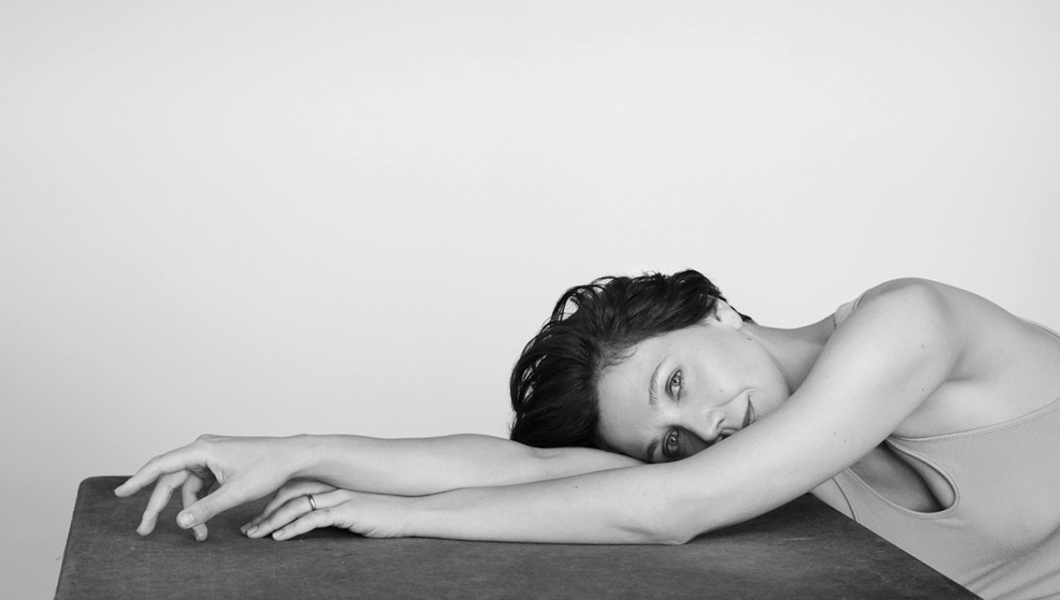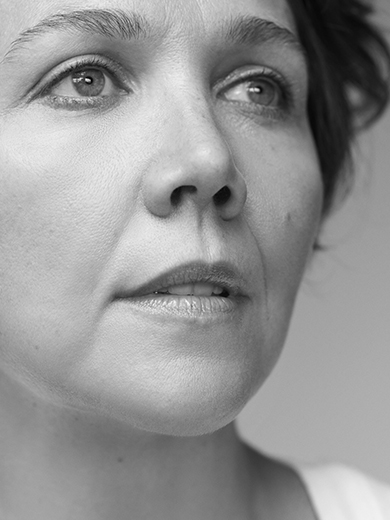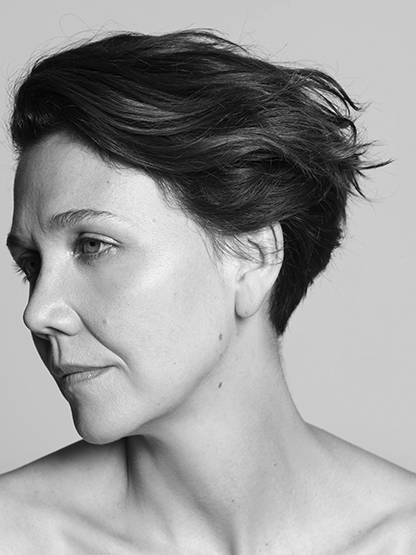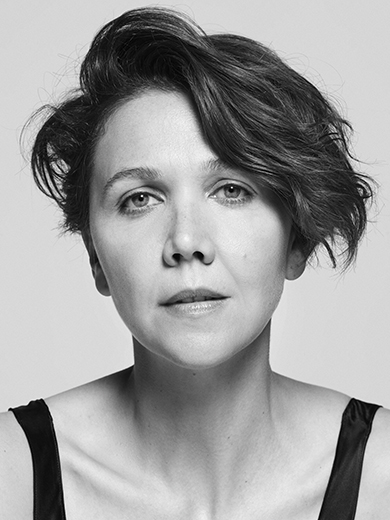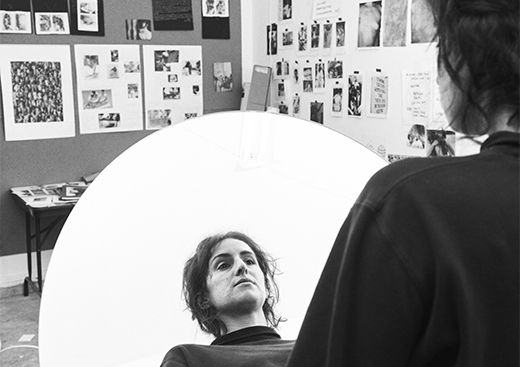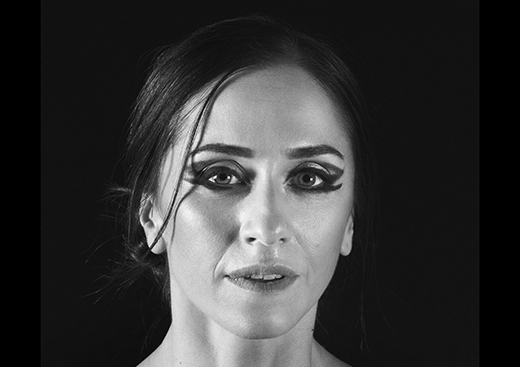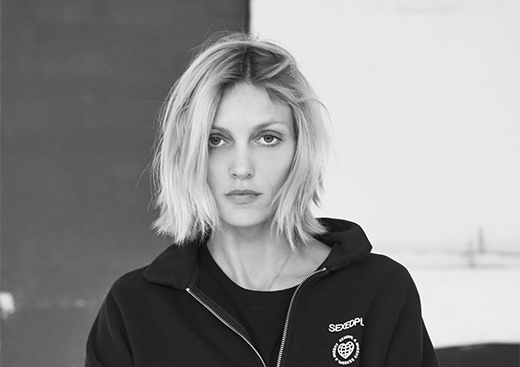I was honored to have met and photographed Maggie Gyllenhaal. She is a fascinating woman. As an actor she has played some of the most complex and contradictory roles. With her artistry she transports us into the real and truthful world of the characters she plays. She is also a producer, a writer and a director. Throughout the years, she has made very interesting choices, balancing work and family and being a mother who leads by example. She is also an advocate for climate change.
Thank you, Stephanie, for jumping in to do this interview and thank you so much Maggie for your truly inspiring answers.
STEPHANIE TROXELL: All right. So, what was your childhood like? Would you say that you were a creative kid? And what was your relationship with your parents like?
MAGGIE GYLLENHAAL: My childhood. Yeah, I guess … I once dated this guy who was not an artist, and I remember just being surprised by how different his mind worked. Like, I was just expecting him to think sort of fundamentally like an artist. I was 18 or 19 when I dated him, and it just makes me think that—I grew up with people who were artists, who thought kind of always in their … I don’t know, maybe in a metaphorical way, in a way that included kind of leaps of faith maybe. So, yeah, I think I was a creative kid. I think my parents were kind of big personalities, and it took me a while to really hear my own voice, but yeah, I think I always was creative. I think I always was probably an actress, too, and a storyteller, even just in terms of the way I played and what excited me.
STEPHANIE: Do you feel that your parents encouraged you to pursue a career as an actress?
MAGGIE: Yeah, I do. I think I was good at it, and I think in my house it was important to be good at things, which is kind of a shame, because if you’re not good at something immediately, or it doesn’t come easily to you, there wasn’t a lot of space for that in my house, really, and so I think really interesting things can happen when you struggle with things, but acting, it just kind of came naturally to me. It was sort of fun and easy, and I liked the kind of trance that it would put me in when I was young.
STEPHANIE: How was working with your father directing you when you were a teenager? What was that experience like?
MAGGIE: It was really more that my dad was a director, and I would have a tiny little part now and then in a movie that he directed. It was more like a way of visiting my dad when he was at work.
STEPHANIE: Oh, that’s sweet. How do you choose the roles you take on?
MAGGIE: You know, it’s funny. I just read a bunch of scripts, right, because I just finished The Deuce, and I’m looking to work, and so I just read four scripts, and two of them I just wasn’t interested in it at all. I didn’t like them. They didn’t appeal to my sensibility. They didn’t appeal to my taste, and then two of them I did like, but one of them actually kind of hooked me in this interesting way, and—how do I put this? Sometimes there are just projects that hook me. They just appeal to me. I’ll just sort of go, oh, there’s something in there that is calling to me in some way, and it’s usually not something that I can analyze intellectually. It’s usually something that’s kind of a part of my unconscious. So it’s a part of this other part of my mind, which has become more and more interesting to me as I’ve gotten older, just kind of opening my mind, opening my heart and going let me just see what comes within, what comes to mind, what comes up if I think about these scenes.
STEPHANIE: Do you think of your children when you’re choosing what projects to work on?
MAGGIE: I think of them logistically. You know, like, for some reason, so often I’ve been offered movies, maybe three times, that are in Australia right when school starts, and basically, I can’t even read those jobs. You know what I mean? There are one or two filmmakers … if Pedro Almodóvar was making that movie, OK, maybe we all go to Australia, but most of the time, that’s just off the table.
There’ll be a time when I can go do some avant-garde play in Norway, but it’s not now. But typically, I don’t censor myself because the things that I’m doing wouldn’t be appropriate for my children, because they rarely are. They rarely are appropriate for my children.
My daughter, who’s almost 13, she’s aware of what The Deuce is about. I play a prostitute, a sex worker, who becomes a porn director, and she said to me before … I mean, I haven’t talked to her very much about it, and certainly not in depth, but she knows what it is, and … it’s a project I’d been working on for four years. And she asked me, why do you have to do this? And I said, look, I’m playing somebody who many, many people in our culture would totally disregard and certainly be really judgmental about, and I’m trying to open up her life in a way that people can understand her and relate to her, and then, hopefully, not disregard and judge her.
STEPHANIE: It seems like you obviously care so much about telling really human and honest stories.
MAGGIE: Well, that’s right. I do feel comforted when I read a book or I see a movie and it expresses something that’s real and human that I haven’t seen expressed before, where I go, oh, that’s a part of my experience, and I didn’t know whether people felt this way. I was maybe so ashamed of that part of myself that I wasn’t even aware of it, and now here it is being expressed somewhere else by someone else. That’s one of the most incredible kind of salves that art can provide. Like, wow, I’m a part of a community of human beings, and this is a part of our shared experience.
I love that feeling. I love it so much, and I want to create that feeling for other people, and so I like to kind of work in the territory of things that I haven’t seen expressed before. And I feel that in particular about expressing a feminine experience, because I think that that is something that hasn’t necessarily had its fair shake. In my experience, I have found that when I … because I’ve gotten used to living in fundamentally a masculine world and just kind of fitting myself into that, which I think we all have. When I come across something that’s a real feminine expression, it makes me feel so good. I’m like, oh, yeah, that’s really how it is for me, too. It’s so nice to hear you say that out loud.
STEPHANIE: How do you navigate that challenge of finding feminine stories to share?
MAGGIE: I mean, I guess I would say in some ways I know them when I see them. Like, oh, here’s a place where I can express something that’s also interesting to me right now, or there’s room here, or there’s the demand in the script that I tell the truth or at least there’s the space for the truth to be told, and I know how to feel my way through that pretty well now. You know, like I said, I picked up a script the other day and I was told by everybody that it’s a good script. They don’t send me scripts they don’t think are good, and I picked it up and I was like, this is just not ringing to me. To me, this just feels completely untrue. So I read 20 pages. Put it down. I’m like, obviously, this person is not after the same thing I’m after, and that’s fine. I mean, everyone doesn’t have to be into what I’m into, but I just know we won’t be a good match. And then also I started writing. And I wrote an adaptation of Elena Ferrante’s book The Lost Daughter that I’m going to direct. So that’s another new way for me to explore these things, and you know, I also find that I really … because I have a group of girlfriends who really like to read and who often recommend books that I then sit down and read and just feel like I’m getting set in that way that we’re talking about. Like, I’m just finishing the Rachel Cusk trilogy. I don’t know if you happened to read that, but …
STEPHANIE: I haven’t.
MAGGIE: She’s very … her main character is very different than me and expresses herself very differently than me, but I really relate to her, and it’s been such a pleasure to read it because it also sort of reminds me, oh, yeah, it’s possible to really tell the truth, because I see a lot of things on TV and movies where, you know, it’s like half true or it’s like three-quarters true, you know, and then when you see something and you’re like, oh, whoa, that person really went for it. They’re just out there telling the truth, and I don’t even mean real, necessarily. You can tell the truth in a stylized way, and I love that.
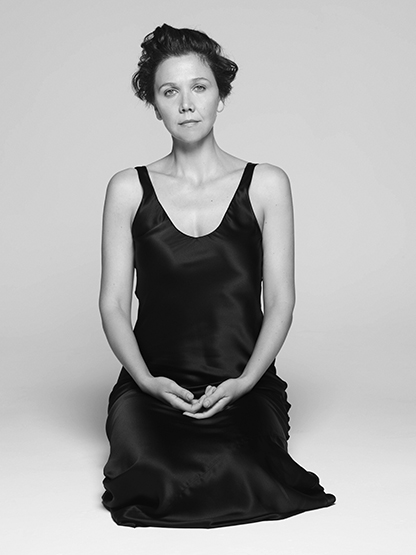
STEPHANIE: Are there things you’ve learned from some of the directors you’ve worked with that influence you as a director? And even in your writing?
MAGGIE: I think kindness is a really invaluable element of directing. I do think you really want to surround yourself with people who know more about what they’re doing than you do. So that I have really specific ideas about, for example, what the lead character in my film is wearing, and yet when my actress comes in, what she thinks that character should be wearing is what she should be wearing. And you know, we can talk about it, but I’m really curious to know what the brilliant actress that I cast thinks this woman should be wearing, and I think there are ways, really interesting ways, to add to the pot that an actor, for example, is creating, but I would rather work with a costume designer who says to me, “Look, I know you wrote she’s got red shoes on in the scene, and I understand why, but what if she were barefoot?” You know, and even if ultimately we don’t go that way, I’d rather have that conversation than just have someone bring in eight pairs of red shoes for me to choose from, you know?
You just can’t hire people you don’t respect. If you don’t respect them and they come and say what if she’s barefoot, then you’re like, no, thank you, red shoes is what I wrote. But you know, if you respect them, then it makes you stop and think, and then everybody’s work is better.
STEPHANIE: Going back to The Lost Daughter, what is it that captured you about the book?
MAGGIE: Well, it’s another one of those books that just really tells the truth, and it’s also full of fantasy and full of a kind of blurring of reality and unconscious reality. You know, it’s not just straight-up realism, but it is rooted in a real honest exploration of a woman’s mind, and that’s all it was. That’s the thoughts.
STEPHANIE: Getting a little bit outside of film, just more general, what are the things that you care most about in life?
MAGGIE: I would say just in general, being actually here and awake and present and alive in the life that I’m living, having real interactions with the people that I love. There’s times in my life where I feel like I’m half asleep, and then that’s the worst for me. So I would say just to really be awake and alive and here.
STEPHANIE: What do you think is important to do to make the world a better place for our children?
MAGGIE: I mean, all of these things that we’ve been talking about my work, I think are also things that I try to live by, to be an example of a woman to my children who is honest about the way I live and about what’s real. Also, I’m very concerned about the planet, and so are my children. My almost-13-year-old is consumed by that and is an activist for climate action. I’m really concerned about what the planet’s going to be like for them.
STEPHANIE: What would be your message to a young woman who has a dream?
MAGGIE: Who has a dream? I think it really never, ever serves you to try to fit yourself into what you think you’re expected to be. Sometimes, short term, it seems like that’s going to help, but I have found it never helps.
STEPHANIE: What have you learned most from your children?
MAGGIE: I would say I’ve learned so much from my children about need. You know, children have this wild, overwhelming need for you, and grown-ups cover that and protect that. It’s so interesting to see, and it’s put me in touch with my own needs, and that’s been just so amazing to see.
STEPHANIE: How have you balanced that role of being there for them and fulfilling their needs while taking care of your own and developing new projects in your career?
MAGGIE: I think it’s kind of someone is always sacrificing, and I think it’s just important not to ever let it be one person for too long. Children can handle sacrificing much less well than adults, and so they can do it a little, but I don’t think they can comfortably do it a lot.
I think it’s important for me to be able to do things that are important to me and for my work and my life, and I do take the time for that, but I also think it’s really more on me to sacrifice than it is on them. But I think it’s so often that I’m faced with a choice, when I’m balancing work and life, and I just have to sort of think it through as best as I can and choose what I think is best, you know, when nothing is perfect.
STEPHANIE: Is the idea of success important? Is there a secret to it?
MAGGIE: I don’t know if there’s a secret to it. I think for me it’s nice to have validation, but I also find that when I really am confident about my work I need much less validation.
STEPHANIE: Paola mentioned that she had read that you have your guard up when it comes to work, at least initially.
MAGGIE: I think I don’t have my guard up in terms of my actual work, but I don’t walk in trusting everybody. I feel like we all need to get to know each other a little first, and I also think there’s times where you meet people you’re working with and you have to use your brain and go, this is not someone I can trust. This is someone who I have to find a way to work with. I don’t just walk in blindly trusting. I think you can get a deeper trust when it’s earned.
And then, at the same time, it’s making me think about when I did Crazy Heart with Jeff Bridges. We had five weeks to shoot that movie; we had to start with people who were deeply in love. Now, that movie doesn’t work unless those characters are deeply in love, because, of course, it’s tragic, and if you’re like, oh, no, take it or leave it, well, then you don’t care. So, yeah, I just remember meeting Jeff and him kind of walking across the parking lot toward me, arms open, and he was open to the challenge. Like, are we going to do this or are we going to fuck around? What are we going to do here? Are we going to go for it? Yeah, and I just jumped off that cliff with him, and we made a beautiful movie.
STEPHANIE: It was a beautiful movie.
Thank you so much, Maggie.
MAGGIE: Thank you so much.
—


